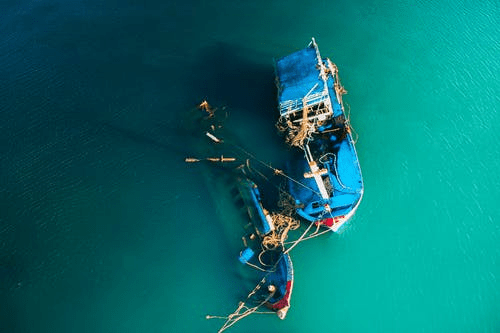By its very definition, a maritime accident is not an act that is conducted deliberately, nor is it something that is done with the intention to cause harm to the integrity of a ship, to an individual within it or to the environment that surrounds it. Nevertheless, they do happen and have been classified in the following manner according to the seriousness of the incident:
-
Very serious marine casualties – Total loss of the vessel, a death, extreme damage to the environment
-
Serious marine casualties – Collisions, grounding, fire, explosion, hull cracking, heavy weather damage, and others
-
Less serious marine casualties – Casualties that do not fall in the above categories
-
Marine incidents – Anything that may endanger the structural integrity, or operations of the craft
What is a marine casualty?
The Code of Federal Regulations (CFR) defines a marine casualty as any fatality, loss, or accident involving a vessel (that is not a public vessel), that occurs within the seaworthy waters of the United States, its territories or its possessions. According to code 46 of the CFR, the term “marine casualty” refers to events caused by or involving a vessel, and it lists specific activities or incidents that constitute a marine casualty, and which include loss of life, collisions, groundings, loss of propulsion, and events involving significant harm to the environment.
What factors contribute to maritime accidents?
Here are the most common issues that play a part in maritime accidents:
Equipment Failure
Although maritime equipment is not only well-designed but adequately built in order to tolerate the stresses they will have to withstand while navigating the ocean, they are made up of a wide assortment of moving parts. Engines can break down, electronic systems may present problems, the weather wreaks havoc, the seas are unpredictable, proper and constant maintenance sometimes fails to be performed, and manuals written in languages that the crew cannot read, all contribute to equipment failure.
Human Error and Insufficient Training
Human error is a consequence of insufficient or inadequate training, lack of experience, exhaustion, or seamen being overworked or overexerted. Even when many functions have been automated, human input is still necessary and does make a difference. And even when properly trained, seamen that are exhausted and overworked are more likely to make poor decisions that lead to damage to the ship or injuries to the seamen and even deaths.
Poor or Inadequate Maintenance
A vessel is a collection of interlinked systems that must work together properly in order to navigate safely. Poor or inadequate maintenance not only harms the ship but can also result in seamen getting injured or even losing their lives. Poorly maintained fuel lines may be responsible for shipboard fires, and malfunctioning doors may result in lost fingers or other body parts.
What are the most common maritime accidents?
Here is a list of the top maritime accidents:
-
Collisions with other ships or structures
-
Grounding
-
Navigational failures
-
Improperly stowed equipment
-
Improperly secured cargo
-
Explosions
-
Fires
-
Slip and falls
-
Trip and falls
Have you been injured while working at sea?
If you or a loved one has been injured while working at sea, consulting with a maritime attorney is a crucial first step. They will help you understand your rights and determine if the accident happened because of negligence and what type of compensation you may seek.
